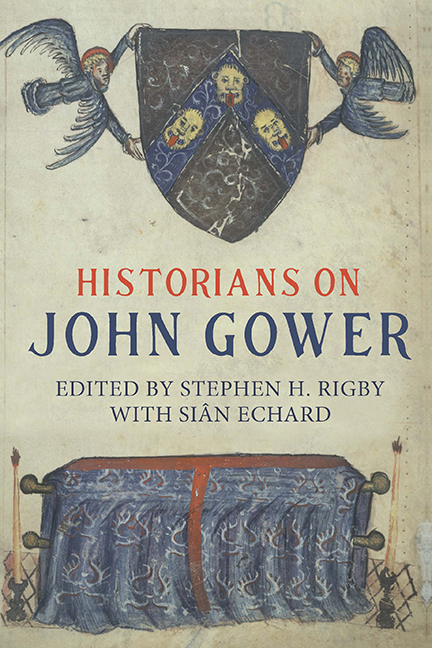Book contents
- Frontmatter
- Dedication
- Contents
- List of Illustrations
- Notes on Editors and Contributors
- Acknowledgements
- List of Abbreviations
- A Note on the References
- Preface: Gower in Context
- PART I Gower’s Life and Works
- PART II GOWER AND LAY SOCIETY
- PART III GOWER AND THE CHURCH
- PART IV GOWER AND GENDER
- PART V GOWER AND POLITICS
- PART VI GOWER AND COSMOGRAPHY
- Select Bibliography
- Index
- VOLUMES ALREADY PUBLISHED
9 - The Friars
Published online by Cambridge University Press: 26 May 2022
- Frontmatter
- Dedication
- Contents
- List of Illustrations
- Notes on Editors and Contributors
- Acknowledgements
- List of Abbreviations
- A Note on the References
- Preface: Gower in Context
- PART I Gower’s Life and Works
- PART II GOWER AND LAY SOCIETY
- PART III GOWER AND THE CHURCH
- PART IV GOWER AND GENDER
- PART V GOWER AND POLITICS
- PART VI GOWER AND COSMOGRAPHY
- Select Bibliography
- Index
- VOLUMES ALREADY PUBLISHED
Summary
Studies of Antifraternalism
Despite the rapid development of Gower studies in recent decades, the poet's views on the mendicant orders have attracted surprisingly little interest from modern scholars. John Fisher, for instance, did not regard the mendicants as one of the poet's major concerns, although he did compare Gower's attitudes towards the friars in Vox Clamantis and in the Mirour de l’Omme with those expressed in Chaucer's work. His discussion thus focused on the literary setting for Gower's criticism of the friars rather than examining it in its historical context. This neglect of Gower's views of the friars may be partly due to the fact that critical interest tends to focus on the Confessio Amantis, which is the only one of Gower's three main works which does not contain verses on the Dominicans, Franciscans and other mendicant orders, and partly because his attitudes towards nobles, lawyers, townspeople and peasants have been seen as more significant. However, whilst literary critics have found little interest in Gower's remarks on the friars, historians of religious orders have turned to poetry as a source for the study of attitudes to the mendicant orders in the thirteenth and fourteenth centuries, especially in times and places when these new orders were involved in disputes and scandals. Such disputes occurred when there were conflicts of interest and tensions about resources, influence and prestige, but they also raised more general theological and ecclesiological concerns.
By Gower's time, there were four main mendicant orders: the Franciscans, the Dominicans, the Austin Friars and the Carmelites. Unlike the Austin Friars and the Carmelites, the Franciscans and the Dominicans could justify their existence with a reference to their charismatic founders and the Dominicans were linked to tradition by the adoption of an existing rule (i.e. of St Augustine). However, the friars often provoked criticism from other churchmen since their organizational structures, which had only been created in the thirteenth century, paid no attention to existing political or ecclesiastical boundaries. Furthermore, doubts arose about their role in the Church. The ensuing disputes had an influence on poets, first of all in France and later also in other parts of Europe, notably England. The analysis of this literature – which expressed an attitude later known as ‘antifraternalism’ – began in the first half of the twentieth century. In 1915 Tiberius Denkinger published his work on the treatment of the mendicants in thirteenth-century French didactic literature, focusing on the poems of Rutebeuf and the Roman de la Rose. A few years later Joseph Spencer Kennard drew a connection between such earlier criticism of the mendicants and their portrayal by Langland and Chaucer. Kennard could not decide upon a perspective and consequently his approach lacked focus, but the initial idea of studying the portrayal of the friars in imaginative literature was taken up by other literary scholars with historical interests.
- Type
- Chapter
- Information
- Historians on John Gower , pp. 291 - 320Publisher: Boydell & BrewerPrint publication year: 2019



